September 2014
Monthly Archive
Sep 23, 2014
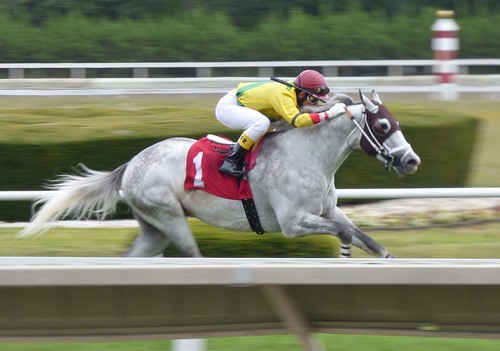
When J and I went to Suffolk Downs the weekend before last, we had no idea it would be the last time we’d watch live horse racing in Revere. Last week the Massachusetts Gaming Commission granted permission for a swanky new casino in Everett, thereby dashing Suffolk Downs’ hopes of building a casino there. Casinos bring in big bucks; live horse racing does not. After the casino decision was made, Suffolk Downs made an announcement that saddened but didn’t surprise me: the 79-year-old track will be closing, with live racing ceasing at the end of the month and simulcast betting continuing through December.
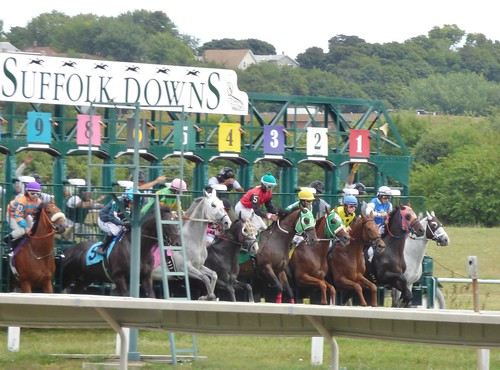
The part about horse racing that interests me is the horse part, not the gambling part, so neither simulcast betting nor swanky new casinos interest me. Had Suffolk Downs won a casino contract, J and I would have gone there to slide a quarter or two into the slot machines, briefly ogle the table games, and otherwise mind our business on our way to the track, where the horses are. But there will be no horses or horse racing at Everett’s new casino, so I’m unimpressed by the proposed development. Why do we need a casino in Everett when the casinos in Connecticut are such a short drive away?
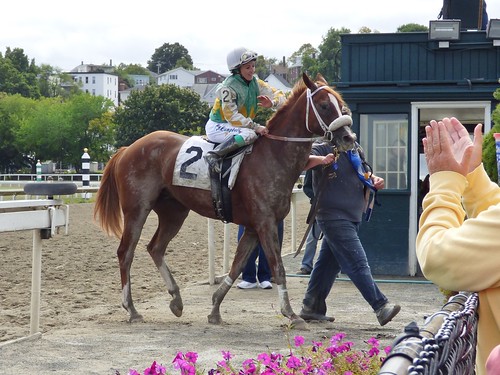
When J and I arrived at Suffolk Downs the weekend before last, there was a little girl loudly cheering for her favorite jockey as she made her way into the Winner’s Circle: Janelle Campbell, the same jockey I’d photographed last year as she sat beaming atop her mount. Being a jockey, I explained in that post, is every horse-crazy girl’s dream job. After Suffolk Downs is shuttered, who will horse-crazy little girls cheer for? Their favorite poker stars or blackjack dealers?
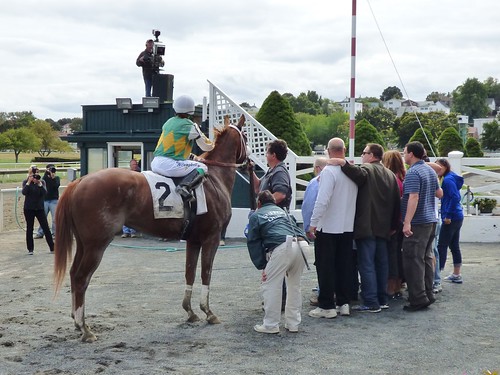
Suffolk Downs is a place past its prime: it’s clean and well-kept, but clearly run down. Every time we’ve gone to Suffolk Downs, J and I have wandered the grandstand, meekly exploring the empty upper concourses and wide, carpeted entryways. In its heyday, Suffolk Downs was packed with enthusiastic race fans; today, sparse handfuls of people watch horses race outside while the serious gamblers stay indoors, where races from other tracks are simulcast on rows of TV screens.
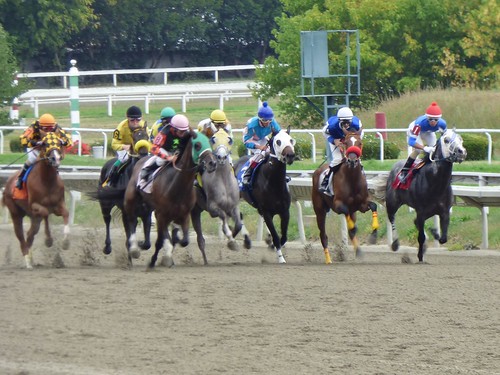
Simulcast races are something you can watch (and bet on) anywhere, including online…and simulcast racing is where the big gaming money is. My personal preference to watch horse racing in person might be shared by horse-crazy little girls, but apparently it’s not shared by the adult population at large. Why do we need live horses racing at Suffolk Downs when it’s so easy to watch (and bet on) horse races on TV? Why even leave the house when you can gamble online?
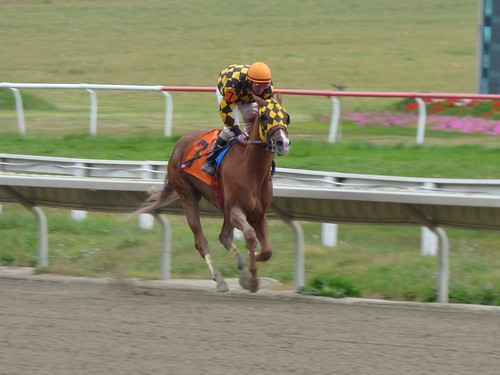
It’s too bad that Suffolk Downs is closing, as it was a place with a history. Both Seabiscuit and Cigar raced there, back when horse racing was glamorous and fast horses were celebrities. The racetrack where my father used to watch (and, yes, bet on) harness horses in Ohio added a casino several years ago, and the place never felt the same. Men now drop their wives at the casino while they go to wager on simulcast races, and my dad stays home to follow the stock market: a different kind of gambling.
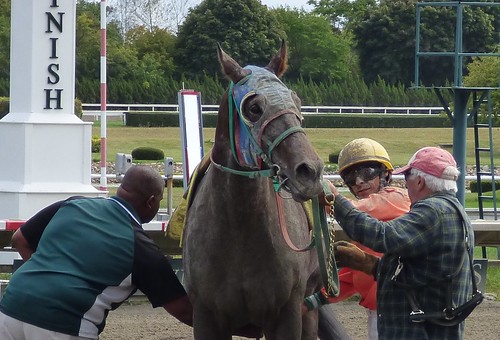
I’m saddened to think of all the horse-folks who will be out of a job when Suffolk Downs closes for good. The new casino in Everett will provide jobs for waitresses, cashiers, and card dealers, but where’s a good groom, jockey, or trainer going to go for a new job?
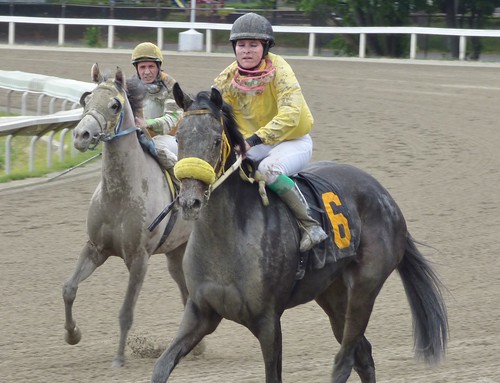
The horses who raced at Suffolk Downs will move on to other tracks, or they’ll retire from racing and find homes with folks looking to adopt sleek saddle horses. It’s a slower life after you’ve been put out to pasture. The world races on, and you get left behind.
Sep 18, 2014

Yesterday morning the schedule-gods smiled and I had a spare half hour to write in my notebook, at home, after having crossed off a list of chores: dishes loaded into the dishwasher, laundry piled into the washing machine, cats fed, and litter boxes cleaned. In the spare half hour before I left to teach three classes and prepare two more before coming home and collapsing, ready to do it all over again, I took a spare half hour to write in my journal.

Whenever I’m away from my journal, I struggle the first day I come back: what to say, and where to start? What I like about journaling is the way it requires you to consider each thing in turn: a neat line of words following words. During a hectic week, my thoughts buzz and swarm, too many flying past at once. When I sit down to write, though, these racing thoughts temporarily slow, with me considering one thought then another then the next. The whole mad dash of ideas, obligations, and must-remembers still zooms past, but for a half hour or so I focus on one face in the passing throng, then another, then the next.
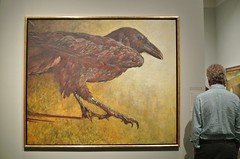
Writing, in other words, takes the place of therapy for me: it is a place where I consider and make sense of my thoughts, a sanity-making device. It is also a kind of devotional act. I feel a sort of reverence and fidelity to the page—this present notebook—and feel a pang of guilt when I stray from it, a faithful friend who has never strayed from me.
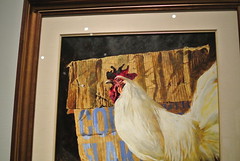
It almost doesn’t matter what I write in my notebook; all that matters is that I do write, coming back to the page that reflects with such honest accuracy the contents of my wandering mind. It doesn’t matter what I write, in other words; it just matters that I have written. In this regard, I see writing as my own secular kind of prayer, as I doubt God cares much about the words we use when we pray, only the fact that we show up and spend some time.

With writing as with prayer, I think you show up as you are, then words are provided for you, each one appearing of its own accord. Both writing and prayer involve great faith. Not only do you need to believe your wishes will be granted, you also need courage to even utter those wishes in the first place. Do you dare open your heart and share the unspoken desires you find there? Do you dare think you can address God without God laughing in your face? Both writing and prayer require faith that what you say is both true and worth saying. Both writing and prayer demand you have courage to continue even when (especially when) no one seems to be listening.
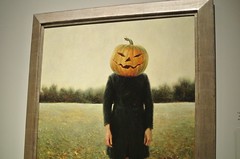
Both writing and prayer, in other words, require infinite faith in yourself: faith that what lies in your heart is true and worth sharing, and faith that you deserve to be heard. Before a child can ask her father for bread rather than a stone, that child must believe she is deserving of bread. Whether God is there reading my words or hearing my prayers is almost beside the point. I myself benefit from the courage it takes to write or pray, whether or not anyone is listening.
(I wrote this entry last week and only got around to posting it today. The photos illustrating today’s post come from the Jamie Wyeth retrospective on exhibit at the Museum of Fine Arts through December.)
Sep 11, 2014
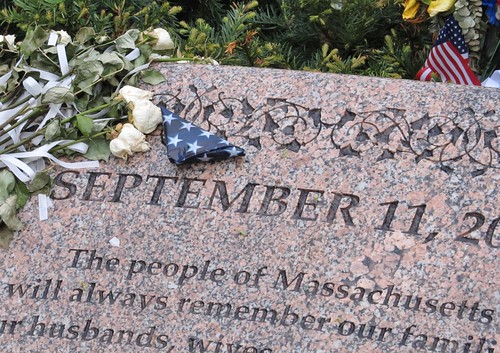
Thursday mornings are hectic, as I cross off a laundry-list of chores before heading to Framingham State to teach an 8:30 am class. This morning as I neared Natick on my way to campus, I saw a flag at half-mast and the date dawned. Today, thirteen years ago. The tears came as unbidden and right as rain: tears for the grief, confusion, and fear everyone felt that crisp and beautiful autumn day thirteen years ago, and tears for all the lives that have been lost since then. How many flags at half-mast have flown these past thirteen years?
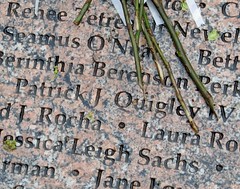
The spring we put Reggie to sleep, I acquired the habit of weeping during my long drives to and from Keene: 90 uninterrupted minutes each way during which I had nothing to do but steer the car and marshal my own thoughts. My car provided a cocoon of privacy; nobody needed to see or know why I had tears streaming down my face, whether for a person or a pet or for the whole sad and suffering world.
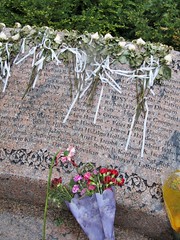
This morning I once again wept in my car: not for any individual person, but for the whole suffering world. I didn’t personally know anyone who was killed on September 11, but that day was a collective wound. Watching the news, hearing the stories, and seeing the flyers posted with pictures of the missing: these were enough to unite us in a shared upwelling of sympathy. When innocent lives are lost, you realize how tenuous and random your own survival is. The people who died on 9/11 and the people who have died in subsequent military operations could easily have been you, me, or any of our loved ones. How can any of us feel safe in a world where some of us are targeted?
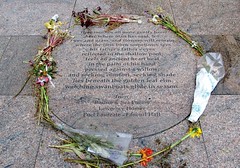
Thirteen years is a lifetime, long enough for a child to ripen into puberty. Now that the first generation of post-9/11 children is entering young adulthood, what has happened to our grief and remembrance? They say that time heals all wounds, but memory (as Salvador Dali suggested) is persistent. Thirteen years was a lifetime ago–I was an entirely different person then, leading a life that now seems alien and unknowable. But the simple sight of a flag at half-mast is all it takes to melt the intervening years, the passage of time revealed as illusion. Grief knows no timetable, and sorrow has no season.
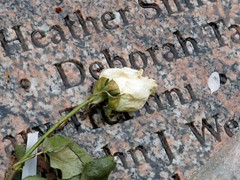
We live in an amnesiac culture that ignores the past while chasing the future. In the pursuit of positivity, we are denied the chance to grieve, instead being told to “get over it.” September 11 is one of the few days a year when we are allowed to drop the pretense of optimism and cheer in order to be somber and still. I wish it were more acceptable to grieve whenever the occasion calls for it. To be awake these days is to have one’s heart broken on a daily basis. Planes fall out of the sky, black boys are shot in the street, and journalists are slaughtered overseas. How can we get over the grief of 9/11 when that day was merely the first in a thirteen-year-long litany of loss? At every turn, there is suffering, death, and mayhem; humanity, it turns out, is infinitely inventive when it comes to hurting one another. But with each instance of hurting also comes an instantaneous outpouring of help.
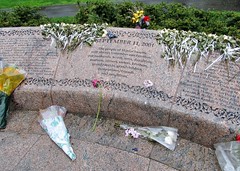
September 11, 2001 was an impossibly beautiful fall day here in New England, an irony that has always struck me as cruel. But perhaps this juxtaposition of tragedy and beauty is merely reflective of the world we live in. In the face of heartbreak, there are hands to help. In the aftermath of suffering comes the strength and resilience to carry on.
I’ve previously blogged these photos of the Garden of Remembrance in Boston’s Public Garden, which I’d shot in May, 2011. In the years since then, this stone memorial is already starting to wear away.
Sep 4, 2014

My fall semester started yesterday, when I taught three first-year writing classes at Curry College; today, I’m teaching two classes at Framingham State. There’s something exhilarating about teaching the first few days of fall semester, when your freshmen are still truly “fresh.”
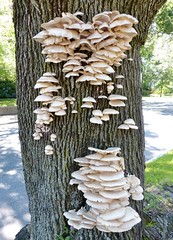
The first few days of fall semester, there’s an air of excitement on campus as students meet new people and make new friends. I didn’t see this side of my Curry students last term, as I was hired in the middle of the second semester, in February, when my students were already tired, jaded, and yearning for spring. Soon enough my students at both schools will be settled into a regular routine, the same old habits emerging, albeit in a new environment. But right now, New England is gearing up for her prettiest season, and right now, first-year college students are full of resolve, determined to leave behind the baggage and bad habits of their high school years, when even the smallest mistakes or indiscretions quickly establish one’s reputation.
At the start of fall semester, one’s self seems supple, September offering an excuse for midyear rather than New Year’s resolutions. This year, students tell themselves, I’ll buckle down and keep up with homework. This year, instructors tell themselves, I won’t procrastinate grading. Hope (in other words) springs eternal, and not just in spring. September is as eager a time as any other, the start of a new school opening the door to ample opportunities.
Sep 2, 2014
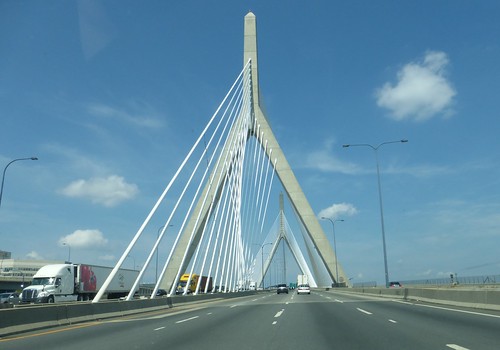
One of my favorite vistas in Boston is one you see when you’re headed northbound out of the city toward either New Hampshire or the northern suburbs. After you’ve snaked through the subterranean labyrinth that is the Tip O’Neill Tunnel, you suddenly are above ground and bathed in light as you ascend the Zakim Bridge with its gleaming white cables.

I don’t know if heaven has a gate, but if it does, surely it can’t be any lovelier than the Zakim Bridge arching overhead on a sunny afternoon.








































